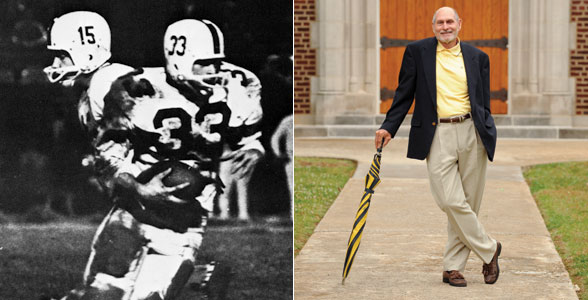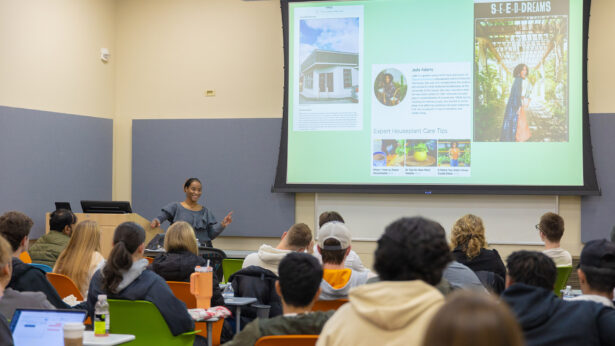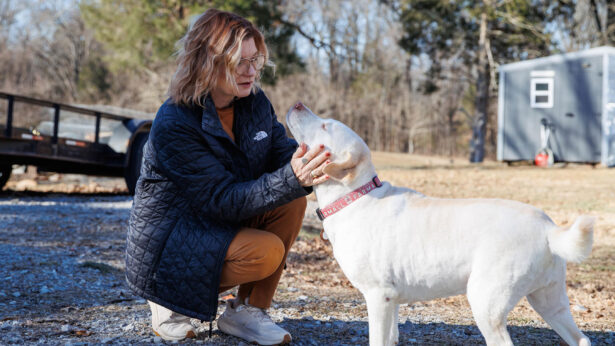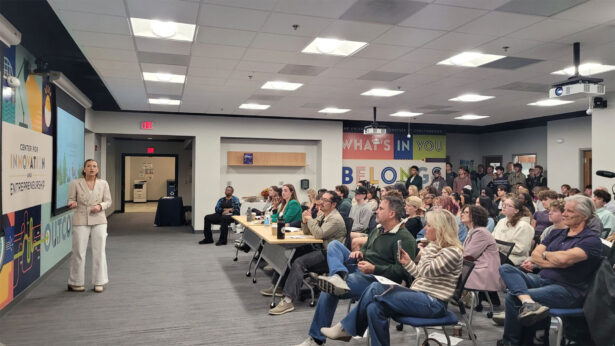By Cindy Carroll
Jerry Harris
Jerry Harris arrived at the University of Chattanooga for his freshman year ready to compete against more than 100 young men for a spot on the football team.
This is one of those stories with a nice ending: He made the team. He earned the scholarship for four years. By 1964, he was named co-captain of the team and a Little All-American as a halfback.
“Football meant so much to me. It gave me an opportunity to get an education. Without football, I don’t know what I would have done. I’ve always felt an obligation to the athletics department,” Harris said.
Harris, a retired schoolteacher, is a Chattanooga alumnus whose degrees straddle two decades and two different schools. His bachelor’s degree in 1964 came from the University of Chattanooga and he received his master’s degree in education in 1970 from the University of Tennessee at Chattanooga.
Attending a private school meant more individualized attention from professors combined with needed discipline. Athletes were allowed to cut class three times a semester—no professor allowed any more excuses, and if you didn’t attend, you failed. It took Harris until sophomore year to get his footing. That’s when he decided he loved school.
“I could have made it athletically, but not academically without the willingness of my professors to work with me. They treated everyone equally. If you needed help, you could ask for it,” Harris said.
Today, Harris and a group of friends from his college days meet once a month for breakfast, and they are thrilled to have representatives from UTC join them. It’s the personal touch Harris appreciates. He likes to talk about the football team turning around, being competitive, while the players make progress toward graduation. He’s always bought season football tickets and for many years also supported the basketball Mocs.
“I have friends who graduated from UC who have no connection to UTC. I don’t understand that. I’ve never felt that way,” Harris said.
Horace Traylor
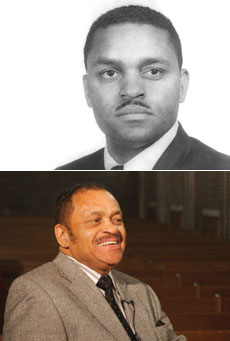 Horace Traylor’s experience at the University of Chattanooga was historic. As the first black graduate of the institution, he earned his master of education degree in 1965. He went on to complete his doctorate at the University of Miami in 1978.
Horace Traylor’s experience at the University of Chattanooga was historic. As the first black graduate of the institution, he earned his master of education degree in 1965. He went on to complete his doctorate at the University of Miami in 1978.
Traylor received his bachelor’s degree at Zion College, a predominantly African American institution, in 1953. On May 17, 1954, Brown v. Board of Education “changed everything,” Traylor said. An institution closed to him in the past, the University of Chattanooga became accessible.
“The first day, it was so quiet. The students didn’t pay any attention. I made a comment that was printed in the newspaper, ‘The only time I knew I was black was when I saw my hands or walked by a mirror.’ I didn’t become a rock star. Nobody wanted my autograph. Nobody wanted to take my picture. It was ‘So you’re here. So what? You’re just a student like everyone else.’ It was normal. It was gratifying. The students seemed to be ready. There was no dissonance from them,” he said.
A few years later, Traylor played another vital role in the history of the Chattanooga campus. While serving as president of City College (the former Zion College), Traylor worked to include the school in the merger between the University of Chattanooga and the University of Tennessee. The three entities came together in 1969 to form what is now UT Chattanooga.
“I wanted to integrate the student body, faculty, and administration. UTC became the most integrated school at that time. It should be that way for every school,” Traylor said. “There was no resistance from the faculty. There was no resistance from the University of Tennessee trustees. There was no resistance from the city of Chattanooga, either black or white.”
Staying on at UTC as special assistant to the chancellor for two years after the merger, Traylor built a reputation as a local leader in race relations and education.
He came back to visit campus recently to share his thoughts in a documentary about the desegregation of Chattanooga. Traylor will be the speaker at the 125th anniversary celebration convocation on Sept. 15.
“I’m impressed. The city has grown. It has a feel like Georgetown,” he said. “And the university has made strides since I left in 1971.”
